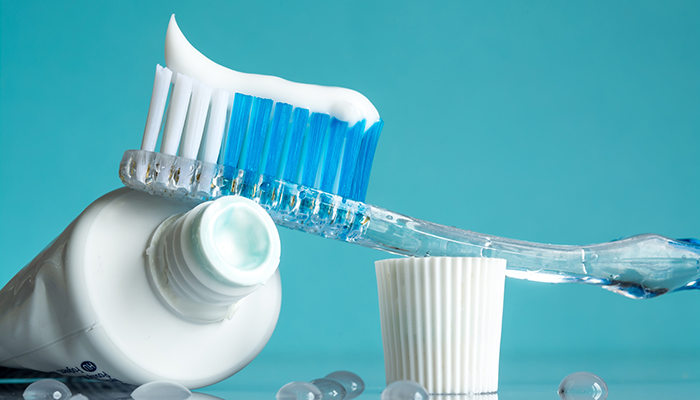Living with final-stage dementia
Just like people with no memory problems, people with dementia experience the breakdown of many systems as they near the last few weeks or months of life. Here we focus on activities you can do to reduce the chance of infections. We also include an article about hallucinations. They are very real for your loved one and require a respectful yet strategic response.
Dad can't brush his teeth
 Is dementia making oral care difficult?
Is dementia making oral care difficult?
Unfortunately, this isn’t a task to let go. Poor mouth care leads to cavities and gum disease, and then to toothaches, sore gums, and a disinterest in food. It can also contribute to a deadly infection, “aspiration pneumonia,” when bacteria collected in the saliva slip down the throat into the lungs.
Toothpaste and brushes. If the person you care for is unable to keep from swallowing, avoid fluoride toothpaste. Instead use just water or a baking soda-based toothpaste. For a better grip, look for a large-handled toothbrush or use an electric one.
Tips for brushing teeth
- Prepare their toothbrush for them.
- Model tooth brushing. Put your toothbrush in your mouth. See if they can follow along. If not, have your loved one sit while you sit or stand behind them. Put your hand on top of theirs to help them brush. Explain each step as you go.
- Try to also brush his or her tongue and the roof of the mouth. Mucus here can harbor harmful bacteria. (Even people with dentures need to have their gums and tongue—and dentures—cleaned.)
- Rather than the bathroom, consider sitting at the kitchen table with a bowl and water. It’s a friendlier, more spacious room. You might add calming music or a special toy to hold.
If brushing doesn’t work
Don’t force your relative. Try just wiping the teeth and gums. A cotton swab, a “toothette” (sponge on a stick), or a cloth wrapped around your finger and dipped in water can be very effective. Use this approach only if you are sure your loved one won’t bite! Anti-plaque mouthwash can be helpful if brushing is not possible, but only if your loved one won’t swallow it by mistake. Call the dentist for further ideas if none of these work.
Frequent infections
- “Mom was moaning and restless all night. Turns out, she has another bladder infection!”
- “Dad’s in the hospital with pneumonia—again.”
- “Another pressure sore. If it’s not one spot, it’s another.”
Sound familiar? In the final stage of dementia, your relative will be more prone to
- urinary tract infections due to incontinence, incomplete emptying of the bladder, and/or not drinking enough water
- aspiration pneumonia due to difficulty brushing teeth or forgetting to chew well or swallow completely
- pressure sores due to lack of moving around and inability to tell others when and where pain is occurring
There are things you can do to help
- Hygiene and water. Keep your loved one clean and dry. Prompt him or her to drink six to eight ounces of water each day. Brush teeth regularly.
- Meal monitoring. Cut up food into small bites. Encourage your loved one to chew thoroughly and fully swallow. Pocketed food is a prime target for bacteria to develop in the mouth and slide into the lungs.
- Skin and body. Lying or sitting in one spot can cause pressure sores. Every two hours, have your family member change position—lie on their side, or back, or other side, for instance.
At some point, no amount of prevention is going to counteract the simple truth that the body is winding down. The immune system is having trouble keeping up. It is time to start thinking about hospice.
Hospice care neither hastens nor prolongs death. Rather, hospice focuses on quality of life and keeping patients comfortable and pain free. For persons with dementia, this includes keeping life simple. If another infection occurs, care is provided right at home. Less confusion and distress for the patient, more support for you.
Many people mistakenly think hospice is only for the last few days. In fact, it is available for up to six months. More if you need it.
If your relative is getting frequent infections, ask the doctor if hospice might be the best form of care.
Return to topHallucinations
“I don’t like that bear on my bed!” A visual hallucination such as this can occur in the later stages of dementia. Some people in this phase also have auditory hallucinations—hearing things that others don’t—or feel things that aren’t there, such as string in their mouth or ants on their arm. These false perceptions are a misfiring of the brain. But they seem very real to the person experiencing them.
When to “join the story”
If the hallucination is not distressing to your loved one, don’t try to reason him or her out of it. Challenging what they perceive is likely to upset them. Instead, participate in their story. They might, for instance, see their mother in the room. You don’t want to lie and pretend you see her also. But you might say, “I remember the time she brought balloons for my birthday. She was so kind.”
Is the person frightened or agitated?
If your loved one is distressed, validate their feelings: “I wouldn’t want a bear on my bed.” Then reassure them that you are there to protect them. Touch your loved one’s arm or hand in a comforting way and suggest doing something together. The act of physical touch can help orient your relative to the present. Leaving the room together—for a cookie or to feed the cat, or some other simple activity—can also help him or her disengage.
Look for a cause
Check for pain or discomfort. Other possible culprits include a full bladder, hunger, thirst, or constipation. Keeping rooms well lit reduces the chance of your loved one misinterpreting shadows or noises. If your relative mistakes his or her own reflection in a mirror for an intruder, cover up mirrors.
Talk with the doctor
Hallucinations can be a side effect of medication or brought on by an infection.
Contact us at (707) 364-5285
